- Home
- Jennifer Ashley
The Pirate Next Door Page 3
The Pirate Next Door Read online
Page 3
Or sleeping without clothes for him, which was why she’d snapped at Alice. The maid had entered the room before Alexandra had had the chance to get into her dressing gown and pretend that all was normal. Alice, a well-trained lady’s maid, had behaved as if seeing her mistress emerge stark naked from under her blankets was nothing unusual. She’d just said, “Tea, madam,” and gone about her business.
“What about him?” Alexandra asked nervously.
“Do we add him to the list?”
Alexandra plucked at her skirt and did not answer. At Christmas at the Featherstones’ last year, Alexandra had expressed the wistful desire to marry again and have children. When she’d also expressed the fear that her second husband might be as loathsome as her first, Lady Featherstone, Alexandra’s late mother’s closest friend, had been understanding itself. The lady had enthusiastically proposed that they draw up a list of the most eligible bachelors in England. They would then observe each carefully and eliminate those not likely to suit.
Alexandra had been hesitant at first, but conceded that Lady Featherstone’s plan made sense. If she had been more particular about her choice in the first place, instead of giddily accepting the first gentleman who’d offered for her, her lot might have been much happier. She might even now be surrounded by the children she longed for, and have a husband whose worst crime was tucking his napkin into his waistcoat at supper. She could forgive a little napkin tucking in a gentleman of kindly disposition. Theo had always been immaculately groomed and had possessed perfect manners. Alexandra had mistaken his studied politeness for kindness of spirit. Theo had played his roles so very, very well.
“You must at the very least invite him to the soiree,” Lady Featherstone rattled on.
Alexandra hid a sigh. Lady Featherstone had persuaded Alexandra to give the event of the season’s end, a soiree that would include everyone who was anyone before they all dispersed for the summer. She felt far too exhausted this afternoon to worry about the details of a party, but Lady Featherstone was smiling eagerly.
“I am not—” she began, but she was interrupted by Jeffrey striding heavily into the room. His wig was crooked.
“Viscount Stoke!” he shouted. Alexandra’s three guests looked up eagerly, ceasing their chatter.
Viscount Stoke appeared in the double doorway, looking utterly composed and certainly not as if he’d spent the previous night battling enemies. He wore a coat today, one so dark blue that it was nearly black, but blue enough to highlight the intense twilight color of his eyes. The coat was buttoned over a lawn shirt, and he had pulled his mane of golden hair back into a tail. Instead of a cravat and collar, he’d tied a black scarf about his throat, covering the bruises left by the rope.
Jeffrey bowed and lumbered out, trying to straighten his wig with his beefy hands. The viscount leaned against the doorframe and bathed the room in a half smile. “Good afternoon, ladies.”
Chapter Four
Three pairs of eyes widened, three mouths dropped open. Three feminine and giggling voices said, “Good afternoon, my lord.”
Alexandra rose to her feet. “My lord.” She hoped her voice did not sound all trembly by the time it reached him.
He folded his arms, settling in. He swept his gaze over the room and brought it to rest on Alexandra. His blue eyes were knowing. He’d guessed—he must have—that she had indeed slept in her skin, as he’d suggested. That and she’d dreamed all night of the hot touch of his tongue on her lips.
“I am looking for my daughter,” he announced.
Maggie had arrived shortly before Alexandra’s first callers with Mr. Oliver, the dark-skinned manservant, in tow. She had greeted Alexandra cheerfully, then asked to see Jeffrey and Cook. Mr. Oliver had led her downstairs. She had discarded the pink frock for boy’s breeches, small boots, and a shirt much too big for her.
“Yes, indeed,” Alexandra croaked. “She is downstairs, in the kitchens.”
“Ah, good. She likes kitchens.”
He made no move to explain his strange remark or to leave. His stance was comfortable, as if he meant to lean there all afternoon.
Lady Featherstone, never shy, spoke up. “I was not aware you had a daughter, Lord Stoke. How old is she?”
“She is twelve.” No hesitation this time. A spark of pride lit his eye. “And a little hellion.”
“Ah, they soon grow out of that,” Lady Featherstone said, with the experienced air of one who had raised three daughters. “An excellent governess and a little polish, and they become fine and pleasant young ladies.”
The statement did not seem to interest him. He returned his gaze to Alexandra. “Thank you, Mrs. Alastair.” He managed to make the simple politeness drip with wickedness. “I will fetch Maggie and go.”
Alexandra cast about for something intelligent to say. Something witty. Something that would not make her look like half the fool she felt at present.
His smile deepened, as if he read her thoughts; then he pushed himself from the doorframe, made a half-bow to them all, and turned and strolled away.
Alexandra’s sigh blended with those of her three guests. Mrs. Tetley snapped open her fan and waved it rapidly. Mrs. Waters dreamily reached for another petit four.
Alexandra sank to the settee, her legs weak. Lady Featherstone leaned to her and tapped her arm with her fan. “We shall most certainly place him on the list.”
Alexandra opened her mouth to protest, then closed it again. How could she explain why the viscount was not a suitable candidate? Since her husband’s death, Alexandra had lived a predictable and unexciting existence, which, after Theo, had been rather restful. Last night had shaken that existence. Gentlemen like Viscount Stoke, who fought with cutlasses and kissed like fire and demanded that she sleep without her clothes, did not enter her world. She was not prepared for such a man, not ready to face anything more exciting than a choice in her morning tea. She had created the list of suitors to ensure that her next marriage would flow along comfortably and predictably. Viscount Stoke had no place on that list.
It had also occurred to her that the viscount’s request, coupled with the brazen way he’d licked her lower lip, had effectively stopped her asking him questions. Just as he’d wanted.
Mrs. Waters delicately shook crumbs from her fingertips. “I heard, and this is in deepest confidence, ladies—”
Lady Featherstone and Mrs. Tetley leaned forward.
“Mr. Waters imparted to me that someone told him that the viscount—” she dropped her voice to a whisper—“used to be a pirate.”
Mrs. Tetley’s breath hissed. “No!”
“Oh, yes. He certainly looks like a pirate, does he not?”
Mrs. Tetley fanned herself thoughtfully. “He did run away to sea when he was a lad, after the tragedy with his parents.”
Mrs. Waters looked interested. “Tragedy? I had not heard about this.”
Alexandra’s curiosity sat up and pricked its ears, though she knew she should stop their gossiping. It was common practice to dissect someone not in the room, but she had never been comfortable with such things. Besides, the viscount was still in the house, and could very well overhear them. He would naturally be angry that his family’s dirty linen was being hung out for public scrutiny. She, as hostess, would be to blame.
Before she could speak, Mrs. Tetley went on, “It was horrible, from what I have heard. My sister’s husband knew his family in Gloucestershire, and it was quite a scandal at the time. His father, one Mr. Archibald Finley, in a fit of jealous rage, shot his wife, then turned the pistol on himself. The viscount was only a boy at the time. Can you imagine?”
Alexandra’s curiosity slunk away and pity took its place. “Oh, the poor man.”
“The son of a murderer?” Mrs. Waters asked, eyes wide. “No wonder he became a pirate.”
Lady Featherstone looked skeptical. “Would a pirate have a daughter?”
“Hmm.” Mrs. Waters stared into space for a moment, and then she brightened. “Pe
rhaps she is the daughter of a maiden he once ravished.”
“That would have been a long time ago,” Mrs. Tetley said.
Mrs. Waters took on a faraway expression. “Can you imagine if you were a passenger on a ship he had boarded? He’d come to your cabin—” she looked dreamily at the doorway from which he’d departed—“and take liberties with your person. Against the cabin wall, perhaps.” The room descended into thoughtful silence, broken only by the sound of carriages and horses passing in the street. “Then he’d tear the jewels from your throat and vanish into the smoke.” She let out a long and satisfied sigh.
Lady Featherstone lifted her teacup decisively. “You read far too many novels, Cynthia.” She leaned to Alexandra and whispered, “Besides, she must weigh twenty stone.”
Alexandra pushed aside the enticing vision of herself being taken by the viscount against the wall of a ship’s cabin. He would kiss her just as he’d kissed her on the floor of his bedchamber, his lips bruising and commanding. Her hands would rest on his wide shoulders, and he would kiss her and kiss her and kiss her.
When he was finished, he’d lay her, exhausted and weak, on the bunk. He’d come away with her necklace in his hand. “I will keep this to remember you by, dear lady,” he would say in a low voice. He would give her a look with his dark blue eyes, press a light kiss to her lips, then turn and sweep away.
She drew a long breath, forcing her fantasy aside. “Be that as it may, we have no proof that he was a pirate.” She fanned her hot face. “He is simply a viscount living next door to me. Trying to raise a daughter by himself.” She paused. “At least, I do not believe his wife is still living. The house is certainly that of a bachelor.”
Lady Featherstone gaped. “You were inside his house? When? Why on earth didn’t you tell me?”
Alexandra flushed. “Well—”
“What was it like?” Mrs. Waters asked eagerly.
Alexandra foundered. “Well, he has only just moved in, hasn’t he? Naturally everything is at sixes and sevens. Much of the old viscount’s furniture is still there.”
Mrs. Waters looked disappointed. “I heard he brought home boxes of treasure—jewels and silks and exotic things.”
Alexandra remembered his words, low and sultry: I have opals that would shine like white fire in your hair. Where would he get a handful of loose opals that he wanted to take to the jeweler to set? “Well, of course he must have some mementoes of his travels.”
“Visit him again and find out.”
Mrs. Tetley joined in. “Yes. Consider it your duty, Alexandra, to storm the battlements and find out if he is truly a pirate.” She gave a very unmatronly giggle. “And then tell us everything.”
Alexandra regarded them in dismay. They had fired her own curiosity, but she certainly did not want to snoop and report to them. Besides, if she made a habit of dashing in and out of the viscount’s house, people would talk. She must avoid scandal if she was to go on the marriage mart again.
Of course, she would have to venture to speak to him about Maggie’s clothes, or rather, her lack of them. Pirate or no, the viscount obviously had no idea how a twelve-year-old girl should be dressed. She could offer her knowledge and assistance in this area. Which meant she would have to take Maggie shopping and help her set up her wardrobe, which would entail any number of visits to the house.
No. Her better self pushed the idea firmly from her mind. She would not poke and pry, and she certainly would not use a little girl as an excuse to do so.
Although Maggie did need clothes. Alexandra knew a dressmaker who did excellent work for younger ladies. And for her governess—of course, Mrs. Fairchild. Her heart leapt. Mrs. Fairchild—the lovely, well-mannered woman who had been Alexandra’s last governess, who had given Alexandra her final polish before her debut—would be perfect for Maggie. Mrs. Fairchild had married an Oxford don just before Alexandra’s wedding, but she was a widow now, and had written Alexandra that she planned to return to tutoring girls.
“Ladies, I—” she began.
She was saved having to explain by a horrible grinding sound of wood on pavement just outside the window. Then came the crash of glass, screams of horses, fervent curses of men, and the frightened cries of passers-by.
Alexandra leapt to her feet. She and her guests hurried to the front window, and Alexandra pulled back the drape. Outside, the summer street scene had changed to chaos. A carriage lay overturned on the stones, its roof inches from the railing that separated the street from her scullery stairs. A delivery wagon lay askew across half the road, and another carriage had spun to collide with it. Horses screamed and struggled in their harnesses, trapped by tethers and chains. A window of the overturned carriage had cracked straight across.
Men scurried toward the wreckage. A few coachmen stood on the boxes of their fine carriages and cursed the delay. An army officer in brilliant infantry red hurried toward the accident. A blond, bespectacled gentleman in a subdued, curate-like suit climbed down from his phaeton, tossed his reins to a boy, and rushed to help.
The viscount emerged from his house and waded into the mess. “Cut the harnesses!” he shouted. “Get them loose.”
His daughter scurried out behind him. Nimble in her boy’s clothes, she climbed to the top of the overturned carriage and began assisting the coach’s shaken footman to pry open the carriage door.
Alexandra turned from the window and snatched up a Turkish shawl from the divan. “People will be hurt.”
She hurried from the room, bumping into Jeffrey on the way out. He flailed back, bleated an apology, then dashed to open the door for her.
Grosvenor Street was a busy thoroughfare. Not only did elegant Mayfair carriages and phaetons trundle up and down it, but delivery wagons, builders’ carts, peddlers, men on horseback, and pedestrians used the street as a main route between Bond Street and Grosvenor Square. The congestion made an excellent opportunity for accidents, but Alexandra had not seen one this ugly in a long while. The last had occurred just after her husband’s death. On that occasion, she’d had to replace her window, her draperies, and a Hepplewhite console table when a broken timber from a struck cart had sailed into her reception room. No one had been hurt, although Jeffrey had refused to enter the reception room for about six months. But from the frightened sobbing she heard through the now-open carriage door, she feared the worst.
The footman, white to the lips, reached down and lifted out a woman, young and pale-haired, into the sunlight. She had a cut on her forehead and looked about with a dazed expression. Maggie put an arm around her shoulders and helped her sit on the edge of the carriage so that the carter could lift her down.
Alexandra hurried forward and draped the expensive shawl over the poor woman’s shoulders. The woman turned to her, unseeing, then pressed a trembling hand to her abdomen. Alexandra recognized the gesture and the slight protrusion in her belly for what it was. The lady was increasing.
She led her away from the wreckage. The carriage blocked the way to Alexandra’s front door; they’d have to find some way around it. She surmised the wild-eyed young man Maggie was guiding to the edge of the carriage was the husband. He dropped to the ground and rushed to his wife.
“I knew that coachman was mad,” he jabbered. “We should never had hired him. I knew he’d bring us to grief.”
The lady only stared at him, too dazed to respond. Alexandra put her arm around the woman’s shoulder and chafed her wrists. She crooned a few words of comfort, but she knew that the lady did not hear her. Doubtless her fears were turned inward, to the child she so precariously carried.
Alexandra certainly knew that fear. A pang touched her as she remembered the weeks and weeks of feeling the growing life inside her, the great protectiveness she’d nurtured for the little being she carried. She had sung to him when she thought no one could hear. When she’d finally borne him, several weeks too early, the pain had been nearly unbearable. The doctors and midwife had watched her somberly, certain both mother a
nd child would die. But Alexandra had lived, forcing herself to survive for the sake of her child. Her little boy had only managed to hold on for one day, then died.
She held the lady’s hand a little tighter, wishing she could ensure that the child inside her would never come to harm.
Lady Seton, Alexandra’s far neighbor, ran from her front door toward them. “Oh, you poor dears. Come inside. I will give you some tea. And brandy.”
Alexandra was about to protest that the pair could certainly come to her house, but she realized this was not the time to fight over them. She led the couple to Lady Seton’s door, then relinquished them. The gentleman, trying to cover his fear with blustering, went on and on about the damned coachman until Lady Seton’s footman closed the door.
Alexandra returned to the wreckage. Fortunately, no one else had been hurt. The viscount and a carter helping him had managed to free the horses. The beasts danced about the street, eyes rolling, heads tossing. The viscount and the carter were now trying to calm them.
The horses from the other two conveyances were being led off out of the way. Maggie stood on the carriage, hands on hips, surveying the mess. It was positively indecent for her to stand out here in breeches, but Alexandra had to admit the girl would not have been able to help had she been hampered by skirts.
Another elegant carriage stopped on the far side of the wreckage. The Duke of St. Clair, one of her expected guests, emerged from it along with Lord Hildebrand Caldicott and his sister. The three of them skirted the debris and met Alexandra at her open front door.
“Good heavens,” the duke exclaimed. “Mrs. Alastair, are you all right?”
“I am, yes.” She cast a glance at Lady Seton’s front windows. “It seems no one was badly hurt, thank heavens.” Though there was still a danger to the young woman and her unborn child. Alexandra bit her lip, hoping that the trauma of the accident would not cause the lady to miscarry. Lady Seton was the motherly sort; no doubt she’d insist on the young woman resting a while before trying to return home.

 Grant
Grant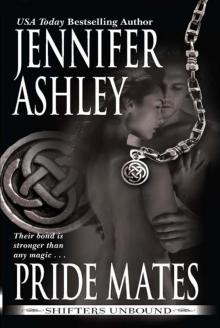 Pride Mates
Pride Mates The Duke's Perfect Wife
The Duke's Perfect Wife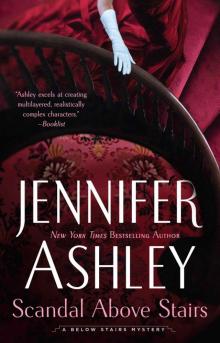 Scandal Above Stairs
Scandal Above Stairs White Tiger
White Tiger Midnight Wolf
Midnight Wolf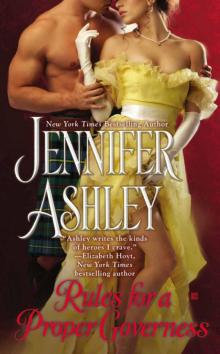 Rules for a Proper Governess
Rules for a Proper Governess Wild Wolf
Wild Wolf Bad Wolf
Bad Wolf Lion Eyes
Lion Eyes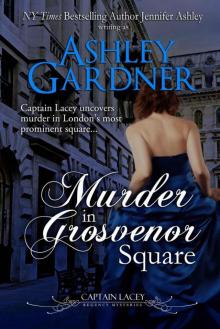 Murder in Grosvenor Square
Murder in Grosvenor Square The Untamed MacKenzie
The Untamed MacKenzie Wicked Deeds of Daniel Mackenzie
Wicked Deeds of Daniel Mackenzie Tiger Striped_Shifters Unbound
Tiger Striped_Shifters Unbound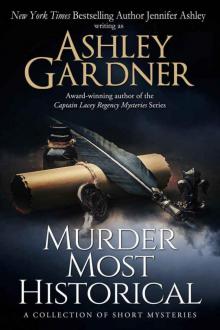 Murder Most Historical
Murder Most Historical Shifter Made
Shifter Made Mate Bond
Mate Bond Tiger Striped
Tiger Striped Bodyguard
Bodyguard Guardian's Mate
Guardian's Mate From Jennifer Ashley, With Love
From Jennifer Ashley, With Love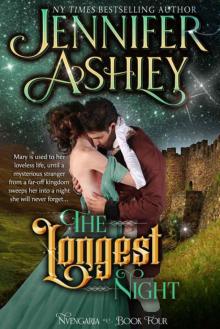 The Longest Night
The Longest Night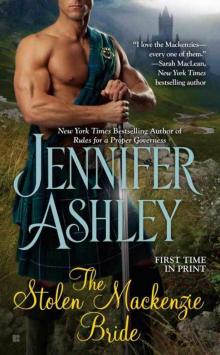 The Stolen Mackenzie Bride
The Stolen Mackenzie Bride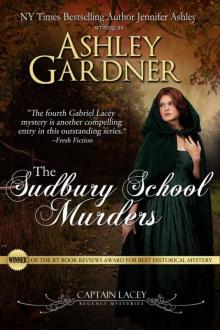 The Sudbury School Murders
The Sudbury School Murders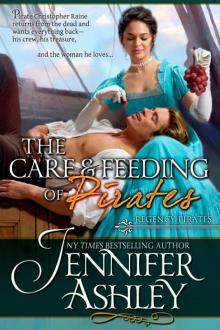 The Care & Feeding of Pirates
The Care & Feeding of Pirates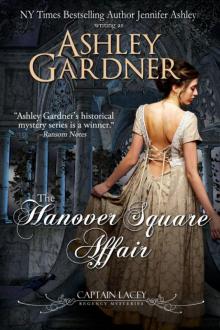 The Hanover Square Affair
The Hanover Square Affair Death Below Stairs
Death Below Stairs Wild Things
Wild Things Wild Cat
Wild Cat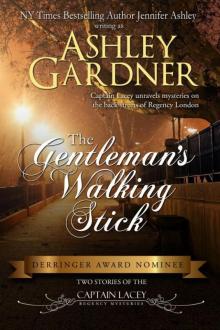 The Gentleman's Walking Stick
The Gentleman's Walking Stick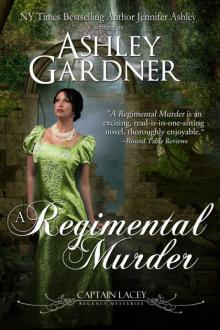 A Regimental Murder
A Regimental Murder Lone Wolf
Lone Wolf Forbidden Taste
Forbidden Taste Red Wolf
Red Wolf The Madness of Lord Ian Mackenzie
The Madness of Lord Ian Mackenzie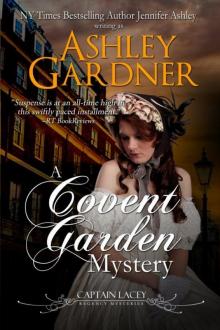 A Covent Garden Mystery
A Covent Garden Mystery The Pirate Next Door
The Pirate Next Door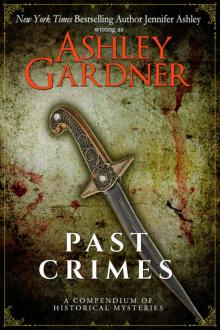 Past Crimes: A Compendium of Historical Mysteries
Past Crimes: A Compendium of Historical Mysteries Highlander Ever After
Highlander Ever After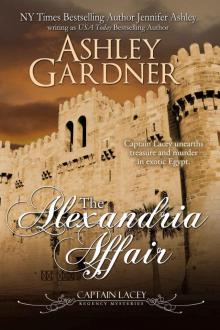 The Alexandria Affair
The Alexandria Affair A Shifter Christmas Carol
A Shifter Christmas Carol The Devilish Lord Will
The Devilish Lord Will Adam
Adam Kyle (Riding Hard Book 6)
Kyle (Riding Hard Book 6)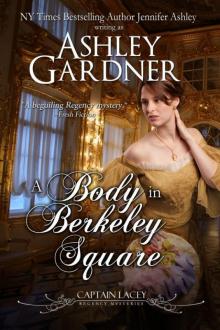 A Body in Berkeley Square
A Body in Berkeley Square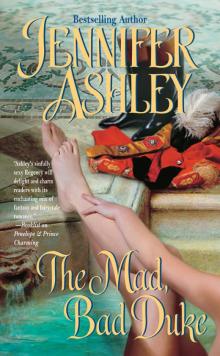 The Mad, Bad Duke
The Mad, Bad Duke Mate Claimed
Mate Claimed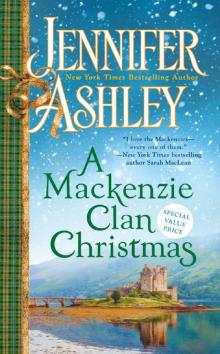 A Mackenzie Clan Christmas
A Mackenzie Clan Christmas The Seduction of Elliot McBride
The Seduction of Elliot McBride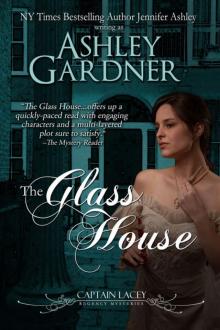 The Glass House
The Glass House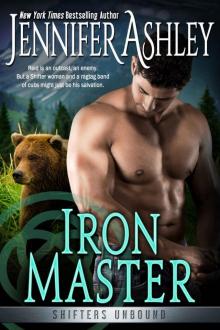 Iron Master (Shifters Unbound Book 12)
Iron Master (Shifters Unbound Book 12) A Mackenzie Family Christmas: The Perfect Gift
A Mackenzie Family Christmas: The Perfect Gift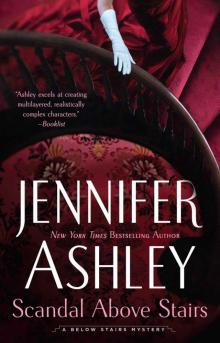 Scandal Above Stairs_A Below Stairs Mystery
Scandal Above Stairs_A Below Stairs Mystery Perfect Mate
Perfect Mate Murder in the East End
Murder in the East End Snowbound in Starlight Bend
Snowbound in Starlight Bend Hard Mated
Hard Mated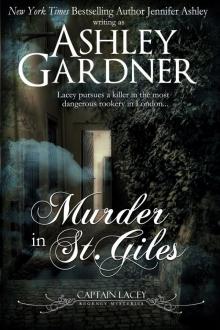 Murder in St. Giles
Murder in St. Giles Alec Mackenzie's Art of Seduction
Alec Mackenzie's Art of Seduction A MacKenzie Clan Gathering
A MacKenzie Clan Gathering Tyler
Tyler Lady Isabella's Scandalous Marriage
Lady Isabella's Scandalous Marriage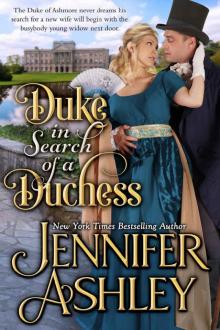 Duke in Search of a Duchess: Sweet Regency Romance
Duke in Search of a Duchess: Sweet Regency Romance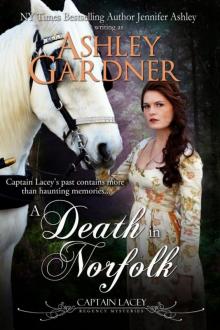 A Death in Norfolk
A Death in Norfolk Give Me One Night (McLaughlin Brothers Book 4)
Give Me One Night (McLaughlin Brothers Book 4) Iron Master
Iron Master The Many Sins of Lord Cameron
The Many Sins of Lord Cameron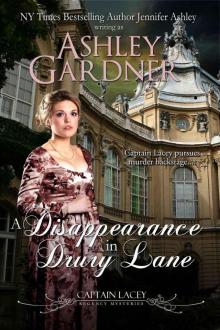 A Disappearance in Drury Lane
A Disappearance in Drury Lane Never Say Never (McLaughlin Brothers Book 3)
Never Say Never (McLaughlin Brothers Book 3) Death in Kew Gardens
Death in Kew Gardens Ross: Riding Hard, Book 5
Ross: Riding Hard, Book 5 Ray: Riding Hard
Ray: Riding Hard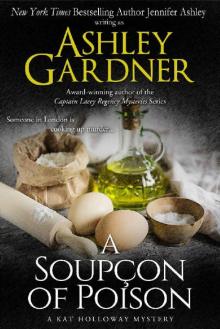 A Soupçon of Poison
A Soupçon of Poison Tiger Magic
Tiger Magic The Pirate Hunter's Lady
The Pirate Hunter's Lady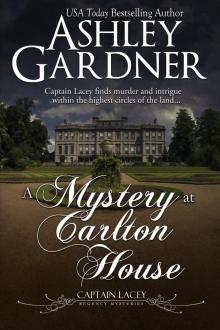 A Mystery at Carlton House
A Mystery at Carlton House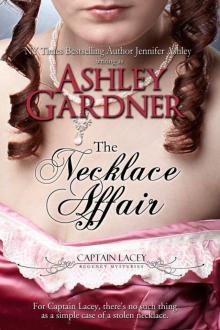 The Necklace Affair
The Necklace Affair Wolf Hunt
Wolf Hunt Scandal and the Duchess
Scandal and the Duchess Kyle
Kyle Why Don't You Stay? ... Forever (McLaughlin Brothers Book 2)
Why Don't You Stay? ... Forever (McLaughlin Brothers Book 2) Bear Attraction
Bear Attraction The Gathering
The Gathering A Mackenzie Yuletide
A Mackenzie Yuletide Wild Things (Shifters Unbound #7.75)
Wild Things (Shifters Unbound #7.75) The Redeeming
The Redeeming The Seduction of Elliot McBride hp-5
The Seduction of Elliot McBride hp-5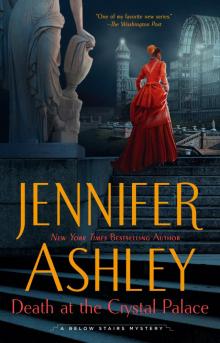 Death at the Crystal Palace
Death at the Crystal Palace Mackenzie Family Christmas: The Perfect Gift (highland pleasures)
Mackenzie Family Christmas: The Perfect Gift (highland pleasures) Forbidden Taste: A Vampire Romance (Immortals)
Forbidden Taste: A Vampire Romance (Immortals)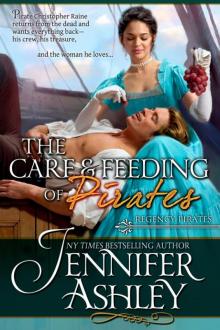 Care and Feeding of Pirates
Care and Feeding of Pirates Shifter Made (shifters unbound)
Shifter Made (shifters unbound) Dark and Dangerous: Six-in-One Hot Paranormal Romances
Dark and Dangerous: Six-in-One Hot Paranormal Romances The Duke’s Perfect Wife hp-4
The Duke’s Perfect Wife hp-4 The Seduction of Elliot McBride (Mackenzies Series)
The Seduction of Elliot McBride (Mackenzies Series)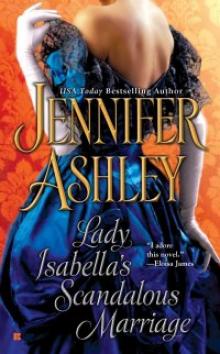 Lady Isabella's Scandalous Marriage hp-2
Lady Isabella's Scandalous Marriage hp-2 BodyGuard (Butterscotch Martini Shots Book 2)
BodyGuard (Butterscotch Martini Shots Book 2) The Wicked Deeds of Daniel Mackenzie hp-6
The Wicked Deeds of Daniel Mackenzie hp-6 Tiger Magic su-5
Tiger Magic su-5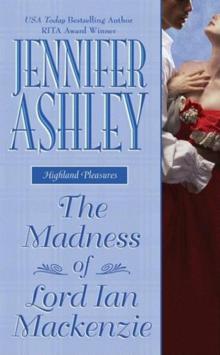 The Madness Of Lord Ian Mackenzie hp-1
The Madness Of Lord Ian Mackenzie hp-1 Alec Mackenzie's Art of Seduction: Mackenzies (Mackenzies Series Book 9)
Alec Mackenzie's Art of Seduction: Mackenzies (Mackenzies Series Book 9) Mackenzie Family Christmas: The Perfect Gift
Mackenzie Family Christmas: The Perfect Gift Bodyguard (Shifters Unbound #2.5)
Bodyguard (Shifters Unbound #2.5) Midnight Wolf (A Shifters Unbound Novel)
Midnight Wolf (A Shifters Unbound Novel) White Tiger (A Shifter's Unbound Novel)
White Tiger (A Shifter's Unbound Novel) Cowboys Last All Night
Cowboys Last All Night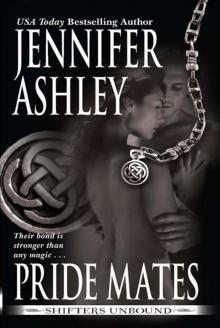 Pride Mates su-1
Pride Mates su-1 Hard Mated (shifters unbound )
Hard Mated (shifters unbound ) Bodyguard (shifters unbound )
Bodyguard (shifters unbound ) Snowbound in Starlight Bend: A Riding Hard Novella
Snowbound in Starlight Bend: A Riding Hard Novella The Untamed Mackenzie (highland pleasures)
The Untamed Mackenzie (highland pleasures) The Untamed Mackenzie (Mackenzies Series)
The Untamed Mackenzie (Mackenzies Series)![Highland Pleasures [6] The Wicked Deeds of Daniel Mackenzie Read online](http://i1.bookreadfree.com/i2/04/07/highland_pleasures_6_the_wicked_deeds_of_daniel_mackenzie_preview.jpg) Highland Pleasures [6] The Wicked Deeds of Daniel Mackenzie
Highland Pleasures [6] The Wicked Deeds of Daniel Mackenzie Lone Wolf (shifters unbound)
Lone Wolf (shifters unbound)![Shifters Unbound [5] Tiger Magic Read online](http://i1.bookreadfree.com/i2/04/11/shifters_unbound_5_tiger_magic_preview.jpg) Shifters Unbound [5] Tiger Magic
Shifters Unbound [5] Tiger Magic Tyler (Riding Hard Book 4)
Tyler (Riding Hard Book 4) Ross
Ross Bad Boys of the Night: Eight Sizzling Paranormal Romances: Paranormal Romance Boxed Set
Bad Boys of the Night: Eight Sizzling Paranormal Romances: Paranormal Romance Boxed Set From Jennifer Ashley, With Love: Three Paranormal Romances from Bestselling Series
From Jennifer Ashley, With Love: Three Paranormal Romances from Bestselling Series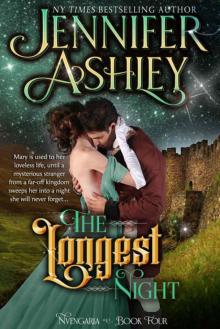 The Longest Night: Fantasy Romance (Nvengaria Book 4)
The Longest Night: Fantasy Romance (Nvengaria Book 4) The Many Sins of Lord Cameron hp-3
The Many Sins of Lord Cameron hp-3 Mate Claimed su-4
Mate Claimed su-4